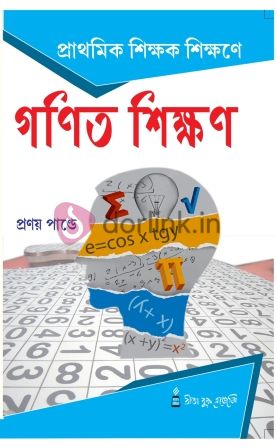Writer : Pranay Pandey
- Shipping Time : 4 Days
- Policy : Return/Cancellation?
You can return physically damaged products or wrong items delivered within 24 hours with photo/video proof.
Contact Customer Support for return initiation and receive return authorization via email. Securely package for return.
Refunds for eligible returns are processed within 7-10 business days via Bank Transfer.
Order cancellation allowed within 24 hours of placing it. Standard policy not applicable for undamaged/wrong product cases. Detailed info. - Genre : Educational>D.El.Ed/B.Ed./M.Ed.
- Publication Year : NA
- ISBN No : NA
- Binding : No Binding Available
- Pages : NA
- Weight : NA
- Height x Width x Depth : xx Inch
If so, it will be notified
About the Book
Unit-1: Perspective about Mathematical Knowledge-1
· Meaning, nature and characteristics of mathematics
· Processes in mathematics—mathematical representations, mathematical relations, mathematical reasoning, problem solving in mathematics and communication in mathematics.
· Goals of Mathematics Education—Cognitive, affective and Psychomotor domain
Unit-2: Perspective about Mathematical knowledge-2
· Aims of teaching mathematics—disciplinary, utilitarian, recreational.
· Objectives of mathematics education of elementary level in terms of competencies/learning outcomes, development of interest and appreciation
· Effect of socio-cultural back ground of children on mathematical knowledge
Unit-3: Pedagogic Content Knowledge-1
· Number: Number concepts, counting, place value, rational numbers, Arithmetic operations, Fractions, Decimals
· Spatial understanding and Shapes—vocabulary of special relationship, basic geometrical shapes and their characteristics, Triangle, Rectangle, Square, Circle, Sphere, Cylinder and Cone, Rectangular parallelopiped, cube.
Unit-4: Pedagogical Content Knowledge-2
· Measurement: Length, perimeter and area of square & rectangle circle, weight, volume, Time and money
· Data handling: Collection and representation of data through various methods—tables, tallies, pictogram and bar graph—interpretation of idea
Unit-5: Elementary Statistics
· Basic concept in statistics
· Tabulation of Data
· Graphical presentation thereof
· Measure of Central Tendency and dispersion
Unit-6: Conceptualization of Mathematics
· Constructivist Approach in Mathematics
· Activity based learning, strategies for concept formation and concept attainment, structuring activities for inductive thinking and inquiry based learning, structuring learning, activities using manipulative, story problems, games, outdoor activities and real life situations.
· Co-operative learning strategies (learning together technique)
· Theory of Mathematics learning : Piaget, Vygotsky, Dienes, Bruner
· Concept of Estimation—Measurement related
· Use of out of School Mathematics for conceptualization of Formal Mathematics
Unit-7: Resource in Mathematics Learning
· Preparation and use of learning materials in mathematics.
· Principles of selection and effective use of LTM
Unit-8: Learning methods and approaches of Mathematics
· Observation, experimentation, Demonstration, Problem Solving
· Project
Unit-9: Planning for Teaching Mathematics
· Unit—wise process based lesson planning, Preparation of lesson notes on the basis of competencies.
· Planning for Teaching—Addressing problems in mathematics teaching and their probable solutions.
Unit-10: Assessment of mathematics Learning
· Meaning and purpose of assessment and evaluations
· CCE in mathematics, Formative and Summative
· Tools of assessment in mathematics—Achievement test and diagnostic test in mathematics construction and use
Assessment of misconceptions in Mathematics

